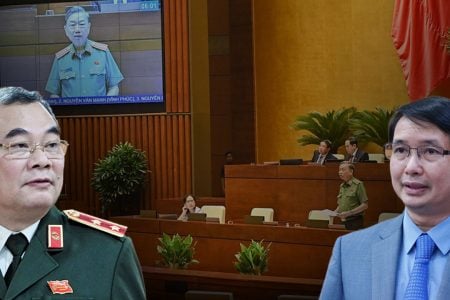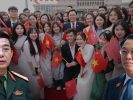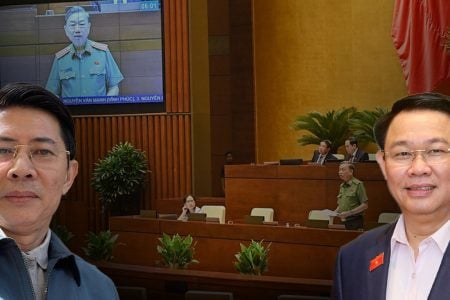The Communist Party of Vietnam (CPV), which has just celebrated the 90th anniversary of its establishment this month, has existed longer than many people thought, especially with rivals during the Vietnam War (1945-1975). When the communist regimes in Eastern Europe and the Soviet Union collapsed in the late 1980s-early 1990, many commentators and analysts expected the remaining communist regimes, especially in Vietnam, to also collap soon.

An important reason why CPV is still growing is because the regime has often adjusted, even fundamentally changed major policies when faces local resistance. Another important reason is that the communists often deal with people’s criticism in subtle and clever ways.
The party’s Secretariat, Politburo, and Central Committee set national priorities.
The prime minister and senior officials are the party’s members.
Every five years, there is a National Assembly election to have delegates representing the constituencies.
Most constituencies have more candidates than seats, so voters have a limited choice of individuals rather than parties.
Most of the candidates are communist members, and as a result the majority of legisters are also. The same procedure applies to electing officials at all levels of local governments.
But despite such continuity, Vietnamese political life has changed a lot. One major reason is that the communist leaders turned 180 degrees away from the direction of national leadership in the 1980s. And one reason why the leadership changes its direction is because of the objection of farmers, workers, businessmen, teachers, intellectuals, and others.
Compared to the Communist regime in North Korea, Cuba, or Laos, the Vietnamese communist regime has surprisingly adaptive changes as a morphological virus. This is the reason why the Communist regime of Vietnam can last longer.

From the acts of non-organization, their non-cooperation still causes officials to shape the way. As a result, from the early 1990s, the country’s political economy was reworked: the market replaced the centralized economic system; family agriculture replaced collectivized agriculture; and state-owned enterprises no longer dominate production and services, but most are now owned by domestic private enterprises and foreign companies.
That change strengthens citizens. The state’s interference in the life of Vietnamese citizens has decreased significantly.
For example, in the 1970s and 1980s, the government restricted travel, people had almost no freedom of association, socializing outside activities and organizations allowed by the state, most residents of the capital. Most people lived in dormitories and citizens had almost no access to information and publications other than those provided by the state.
Today, Vietnamese citizens travel easily and live in private homes. They also form groups, clubs, organizations around needs such as health, the environment, religion, sports, commerce, science, education and politics – which are less often intervened by officials. Some civil society organizations register with government agencies, many do not.
Government and party organizations remain active but no longer monopolize the association life in the country.
Media outside state control has evolved from nothing in the 1970s to the 1980s but it is now numerous. Many Vietnamese today have easy access to radio, international television, and read – often online – newspapers, global publications.
Social media, especially Facebook, has been extremely popular in Vietnam. Citizens in Vietnam also use and create newsletters, magazines, blogs, websites with personal content that can also be very political.
Another major change is that the political criticism of public opinion has become an important factor in the Vietnamese political space.
Until the early 1990s, discontent about the economy, housing, education, employment, land, officials, state policies and most political issues was seldom publicized.
It is said only in family, friends, stealthy activities, for fear that the critic may be punished, even go to jail. This type of opposition and discontent is still common today.
People are opposed to China encroaching on Vietnamese territory and officials seem reluctant to talk about this issue. Dissidents criticize the whole regime and demand democratization. The government’s reaction to criticism of course included cruel repression. But there is also respect, discontent, and even a response. Indeed, an important reason why political criticism among the population has increased is because the government cannot, and is somewhat unwilling, repressive. The second reason is that Vietnamese people, in every region and many places, have motivated, sometimes very actively, to expand the space to be talked about on many issues.
In addition, officials often attach great importance to the state motto “of the people, by the people and for the people,” not merely a slogan.
Public political criticism expands because people are unhappy, dissatisfied and eager to hear. And as a result of the new market economy and communications technology, they have the opportunity, the means to organize and express their demands.
In order to maintain the economic, political and social order, the government felt it was necessary to listen to and follow certain people’s concerns. Therefore, they tolerate and even accept some people’s demands.


Whether women or men, old or young, rural or urban, all can have ready and cheap means – phones, blogs, websites, photos, videos – to express frustration, protest notices, petitions, open letters, complaints to express their concerns.
To a significant extent, communist officials have let the people speak, or cannot stop them from speaking. Organizing a simultaneous, aggressive campaign to stop criticism creates the risk of a political and economic crisis that will almost certainly open up further discontent and challenge the Party’s rule.
The government often supports strike workers, who say employers are deceiving or exploiting them. Officials often found the villagers’ claims to be real, and increased compensation. The government has also revised its labor and land laws to address some concerns of workers and farmers. The government has allowed many anti-China protests. They also left some individuals openly demanding democratization.
The limit of protest when the government becomes repressive differs depending on political issues and activities. In the field of labor, the limitation is when workers plan to set up their own unions. Regarding land conflicts, the government used the police to force people after the dispute lasted for many years, and used the police to disperse large protests.
Officials often tolerate mild critics made by elderly, former military officers, retired government officials, or people having relations with officials, or promoted a non-confrontational democratic approach.
If the past can provide guidance, then perhaps the communist government will be less reliant on suppressing critics, peasant protesters, which will return to tolerance, and respond to complaints and demands of the people
Since the late 1990s, tolerance for democratization and human rights has been up and down. The ignorance was relatively high during 2000-2006, then decreased and the government became more repressive until about 2011. After that, for 5 years, the imprisonment of the critics was reduced. But in the past few years, the regime has returned to imprisoning dissidents.
Recently, the communist regime has proved unusually oppressive to farmers who oppose taking land. On Jan 9 this year, the violent suppression occurred when the central leadership sent armed police and other forces, perhaps more than a thousand troops, into Dong Tam commune, 40 kilometers away from Hanoi. Villagers since 2016 have protested the claim for land. It is not clear why the government decided to give up on ongoing negotiations.
In Vietnam, CPV exists by applying two ways, namely adjusting and changing.
But during 75 years of rule, they have never once given Vietnamese people a voice in the governance and administration of the country, which has led to disastrous mistakes, killing millions of lives and destroying them. Tens of thousands of cities and villages in meaningless wars.
Once the peace was restored, the Party still tried to propagate for the construction of injustice socialism, full of suffering and illusion. This cannot continue and people need to embrace their destiny soon to change the nation.
Hoang Lan from Ha Noi – Thoibao.de (Translated)
Nguồn: BBC




























